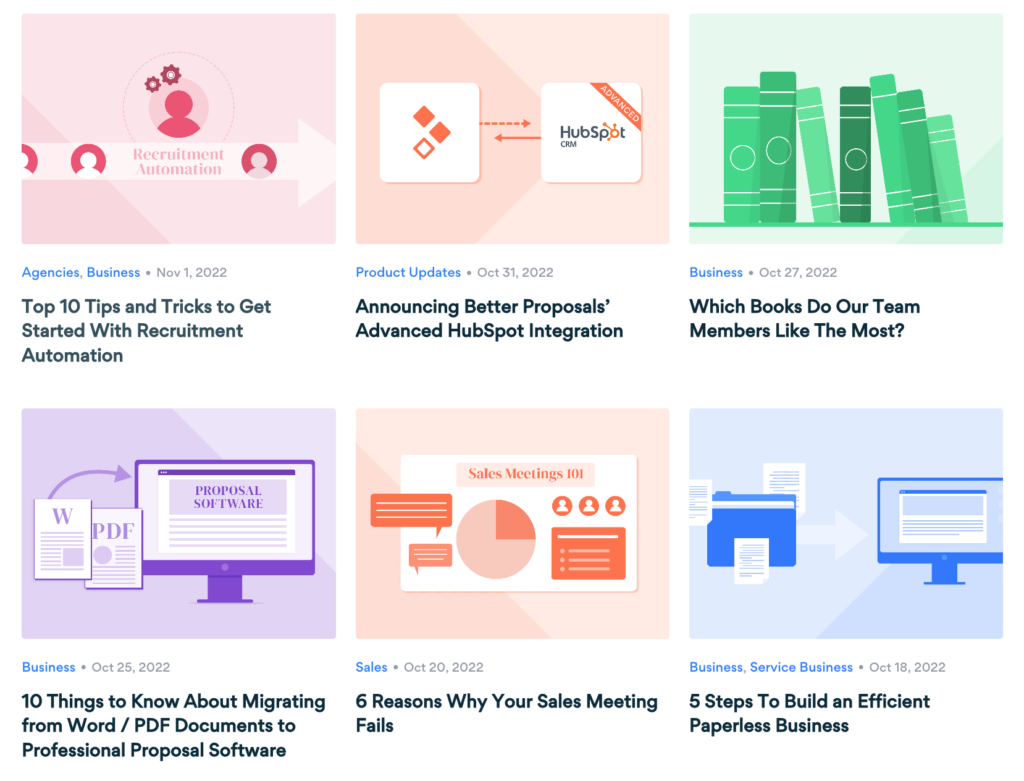[ad_1]
Adam Hempenstall showed his entrepreneurial prowess from an early age, starting a clever side hustle in high school and finding a workaround when faced with challenges.
Years later, when he started his web design company, he inadvertently created a product people loved: the proposals he sent to prospective clients. When enough people asked him for access to them, he went ahead and created a whole company: Better Proposals.
His team is growing, and he’s doubled his revenue every year the business has been operational. Now he’s bringing in +$2.5 million a year.
Keep reading to find out about:
- What happened to his high school side hustle
- Exactly what led to the creation of Better Proposals
- His top marketing strategies
- His views on SEO and link building
- How he does keyword research
- His content creation strategy
- How long it took to achieve his current revenue levels
- His favorite tools and resources
- His greatest challenge
- The accomplishment he’s proudest of
- The important lessons he’s learned over the years
- The biggest mistake he’s made
- His advice for other entrepreneurs
Meet Adam Hempenstall
I grew up in a little town called Southwick near Brighton on the south coast of England.
When I was 14, I launched my first business, selling cassette tapes of WWF wrestlers’ theme songs. My Dad had got us the internet when most people didn’t even know what it was.
I used to download these theme songs and record them to tape and sell them at school. When I finally got banned from selling them at school, I started handing out business cards and taking orders. There was nothing they could do about it, and the business had to go on.
How Better Proposals Came To Be
My business partner Sabrina and I used to run a web design company, and a huge part of the job was writing proposals. We used to send 5 or 6 proposals a week. It was pretty much a hit-or-miss type of deal.
Writing proposals is no picnic. You need to make sure they’re easy to read, informative, and interesting at the same time. Since we were web developers and had quite a bit of experience writing proposals, we built our own internal tool to help us build better proposals.
One thing led to another; the next thing you know, we created the tool and sent proposals through it. It didn’t take long before we had more and more people buy from us and say how cool “that thing you sent the proposal on” was.
Some of them even wanted to have it, but we held on to it as something we use internally. Fast forward a year later, and we decided to launch Better Proposals as a thing of its own.
How Much Adam’s Business Making
We just sailed past $2.5 million per year. I’m pleased to say that we’ve doubled our revenue most of the years we’ve been in business.
You can call us old-fashioned, but we like to run a profitable business, so we haven’t taken out venture capital investments.
His Top Marketing Strategy
Our #1 marketing strategy is content.
Since the beginning, we’ve always emphasized education over selling. We educate through our blog content. That’s the very nature of our product. You can’t sell something that people don’t even know they need and why.

In our approach, we use content to attract and convert viable prospects. About 99% of our business is self-serve, with a tiny percentage being demoed and sold by a product specialist.
In our content research, we focus on the pain points and needs of a specific buyer persona to attract the people who’re most likely to purchase.
His Unique Approach to Getting Customers
We provide more than 200 free document templates and guides for specific industries. That is the content with the largest conversion rate and one we’re constantly working on.
We cover everything from web design to human resources and have specific templates for freelancers, small businesses, and sales teams. Once the customer picks out the template they want to work on, they can customize it in minutes.


The editor is really easy to use and doesn’t require any design experience.
The Importance of SEO
SEO is very important for my business, and parallel to the content strategy, we’ve been trying to increase website awareness and traffic by targeting keywords.
However, lately, we’ve been exploring the keywords and phrases that our competition is not exploiting, the so-called content gap. This way, we increase the chances of our prospects interacting with the content. It’s much better than hoping they’ll stumble upon it independently.
Keyword Research
First, our SEO manager lists general categories for the keywords we wish to rank for. They can be product categories or anything we believe our target audience would be interested in.
Then we expand each topic with a list of phrases we think our customers use. Since we use data from Google Analytics and HubSpot sources, we can look through our organic search traffic to identify keywords consumers use to arrive at our website.
The next step is to find related search terms. Google’s “people also search for” feature and Keyword Planner are great tools to use.
Link Building
Link building is still important, but it’s a gradual process, with the quality and authority of those pages playing a big role in how you rank. Besides blogging as a go-to technique to get backlinks, we’re getting links from social media and infographics.
Adam’s Content Creation Strategy
Our content manager develops a content plan for the next six months or more based on keyword and market analysis. Our content creators execute it. That’s it in short, but there’s actually much more to it than that.
If an article is similar to one of our previously published articles, we consider whether it would make more sense to rewrite and update the old article and recycle that URL.
If our keyword research shows that no one is looking for this topic, but it’s something we feel passionate, and strongly about, then we forget the concept of SEO on this content entirely and write purely for the reader.
On the other hand, if the keyword does have the potential, we give our best to make it the best page on the web for the topic.
We try to have at least 2 pieces published or updated weekly.
Adam’s Email List
We’ve collected over 200,000 email addresses in the form of trial signups for our product. We also grow our list using social media, short videos, and exit pop-ups.
Achieving Current Revenue Levels
It took us about 6 years to get to where we’re at.
The greatest driver is SEO on 2 levels, the first being ranking for what we actually sell, which is proposal software. The second is trying to find people looking to improve their proposal-sending process by ranking for different document types and then guiding them through a carefully curated process to steer them toward becoming customers.
His Favorite Resources
The thing is, I’ve been a huge fan of Basecamp for years. Their simplistic yet powerful approach to building a business and scaling has been a huge source of inspiration in my particular case.
The founders of Basecamp, Jason Fried and David Heinemeier Hansson wrote a book called Rework. It contains helpful, actionable tips you can implement in your business today. It doesn’t make any difference who you are and which phase of the business you’re at.
The Tools He Can’t Live Without
Since our team keeps growing—we’re at 24 currently—there are lots of projects to handle in all departments, so we basically depend on project management tools.
We primarily use Jira. It’s been essential to our growth as well. Their Kanban boards make overseeing projects a piece of cake, especially for our developers and marketers. Intercom is great for product onboarding and other parts of customer support, and we also use a custom-built tool called Super which handles all our metrics.
ProfitWell is also a massive part of our business. It helps us reduce cancellations and gives us accurate revenue reporting.
The Biggest Challenge So Far
One thing I realized very quickly is that what works today doesn’t always work tomorrow.
If you strike gold with Facebook Ads, that’s great. Double down on that, but don’t think you’ve found a magic pill. Keep working and developing new things because, in about 3 weeks, it can fizzle away to nothing.
The biggest lesson I’ve learned is that once you’ve reached a certain point where you’ve got some money coming in, and you’ve got activity, then growth somewhat takes care of itself.
Adam’s Proudest Accomplishment
There are a few things, actually. We’ve managed to retain our 100% remote model. We’ve been working remotely before it became cool because that’s how I want to run my company.
We have no working hours except for the customer support team. Everyone else can work whenever they want as long as they get work done.
Also, we’ve created an excellent product-market fit because the founding team worked in sales for years before launching Better Proposals. We knew exactly what sales professionals needed to make their lives easier.
Finally, we have one of the most raved-about customer support teams in the SaaS business, and our average response time is under 2 minutes. And that’s without any chatbots, canned replies, or any other AI cheats.
We solve our customers’ problems but also give them tips on how to sell more, how to price their packages, how to increase their conversion rates from existing proposals, and more. We deliver value first.
If Only He Knew When He Started Out
There are a couple of things I wish someone had told me.
First, whenever you’re not great at something, delegate. Hiring someone for tasks you’re not good at will save you time and money so you can focus on growing your business.
Also, invest time and money in content marketing. I wish we had done more content back when we started.
Next thing, you want to start acting like a CEO sooner rather than later. Be confident about the choices you make, and everyone else will believe in you. No one has the right answers all the time, but just make sure you believe in your choices.
The fourth thing is not to worry too much about the competition. If they use your idea, that’s just a testament to your ingenuity and talent. Looking at what the competition is doing will rarely give you anything useful. Instead, provide value to your customers and let your competition learn from you instead of the other way around. It’s always better that way.
His Greatest Mistake
We haven’t made any massive mistakes. For me personally, it might be not understanding what the role of the CEO actually means. Because I feel like I stumbled into it. I’m not one who expects every employee to be married to the job, so I approach the team as a coworker more than a boss.
It’s important to me that the team has a good work-life balance, but if I could do it all over again, I would take my role more seriously in the beginning.
As a CEO, you need to be a decision-maker and provide your team with whatever they need to do their job. Sometimes it’s to listen to them and give them comfort, sometimes, it’s to organize workshops, and sometimes it’s to see their strengths and move them to a different job position.
His Advice for Other Entrepreneurs
Keep things simple. Complicating anything is almost never the answer.
Launch early and improve along the way. Think of Jeff Bezos… Ask yourself what never changes. For Amazon, it’s price, selection, and delivery. No one’s ever going to want higher prices, less selection, and slow delivery.
For us, no one’s ever going to want their proposals to look rubbish, their documents to be inconsistent, and to close fewer deals, so that’s what we put focus on.
[ad_2]
Source link


![Our Clients’ Q4 2022 Information Marketing Wins [INFOGRAPHIC]](https://wildfireconcepts.com/wp-content/uploads/2023/01/Our-Clients-Q4-2022-Content-Marketing-Wins-INFOGRAPHIC-1.pngkeepProtocol-440x264.png)






